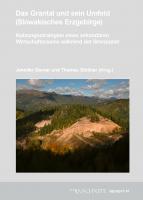Das Grantal und sein Umfeld (Slowakisches Erzgebirge). Nutzungsstrategien eines sekundären Wirtschaftsraumes während der Bronzezeit
Keywords:
bronze age, copper extraction, copper, mining archaeology, SlovakiaSynopsis
The Slovakian Ore Mountains in central Slovakia, which are part of the Western Carpathians, are one of the most important metallogenic regions in central Europe. Over the last decades, the question of their prehistoric use was addressed in several studies, given the rich metal finds and indications of metallurgy, but could only partly be answered due to the complex, multi-phase genesis of the ore deposits, also in comparison to the deposits in Serbia / Bulgaria and the Alps. However, at a general level these studies succeeded in showing the importance of the Slovak deposits as raw material sources from the 4th millennium B.C. onwards, alongside the eastern Alps. Nevertheless, questions concerning the use of the area itself, the organisation of deposit exploitation and the their positive identification as raw material sources have hitherto had to remain open. In addition, the trade routes between the mining area and its surroundings, as well as the integration of the known large-scale settlements in the river valleys and in general the structure of Copper and Bronze Age settlement patterns remain largely unaddressed. Research into mining archaeology has remained somewhat in the background, and initial work was only carried out in Špania Dolina in the 1970s, where finds of mallets and pottery on late medieval and early modern waste dumps suggested use in the Copper and Bronze Ages. Within the framework of a collaborative project focusing on the economic basis of the Early Bronze Age settlement of the Žitava valley, the Deutsches Bergbau-Museum Bochum was invited to contribute to the mining archaeological investigation of the western Slovak Ore Mountains. This was followed by metallurgical and archaeological research on metalworking in the settlement of Fidvar near Vràble and the surrounding micro-region. A further focus was formed by mining archaeological prospection and the excavation of the ore deposits near Banská Bystrica in L’ubietová and Poniky, which were possibly used in the Bronze Age. Finally, the copper deposit of Špania Dolina [Herrengrund] was the centre of targeted fieldwork, as stone mallet and pottery finds from Piesky [Sandberg] indicated its exploitation since the Copper Age. This volume presents the results of our investigations.





